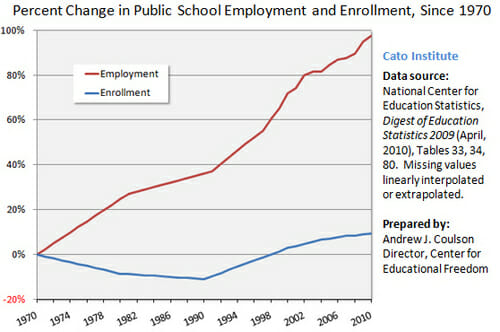Government Prioritization Fail: Adding Staff When It Is Least Essential
Matt Welch has a good article here about a self-refuting NPR piece, which was obviously supposed to be a scare story about the loss of Sequestration money but turned out to be an illustration of just how stupid the sequestration panic was. It's funny listening to the podcast of this episode as the NPR hosts desperately try to support the Administration position.
But one thing I thought was funny was this bit illustrating pre-sequester government staffing prioritization:
NPR's David Greene brings on Yvette Aehle, director of the Southwest Georgia Regional Airport in Albany, Georgia, to talk about the terrible danger that passengers will face now that Aehle's airport stands to lose its air traffic controllers:
AEHLE: Well, I don't really want to say anything is less safe. It's just a better opportunity for people to listen and to be heard and to understand where they are. And also, I'd like to point out that we don't have 24-hour tower coverage here currently. Those air traffic controllers are only directing traffic between 8 am to 8 pm seven days a week. And most of our heavy traffic is outside of those hours.
So the government chooses to staff the control tower only half the day. But they choose to staff the tower during the 12 hours of lightest traffic, presumably because the employees wanted day jobs rather than night jobs.
As an aside, I will confess that my business of running public parks benefits from this. The biggest management load on parks is obviously on weekends and in the evenings (in campgrounds). Most employees of public agencies only work weekday days. Its incredibly typical that public parks employees will take their vacations in July and August, by far the busiest months. One advantage (other than the obvious cost advantage) we have over public operations is that public agencies can't or won't ask their employees to work weekends and defer their vacations out of the summer time. We are perfectly happy to hire people with very clear expectations that the job involves work on weekend and holidays.
I will give you my reminder of how to understand most government agencies: Ignore the agency's stated purpose, and assume that it is being operated primarily for the benefit of its employees. One will very often find that this simple heuristic is far better at explaining agency decisions than relying on the agency's mission statement (this does not mean that there are not dedicated individuals in the agency truly, even selflessly, dedicated to the stated mission -- these two notions are not at all mutually exclusive. Government agencies do not act badly because they are full of bad people, they act badly because their incentives cause good people to do stupid things).


